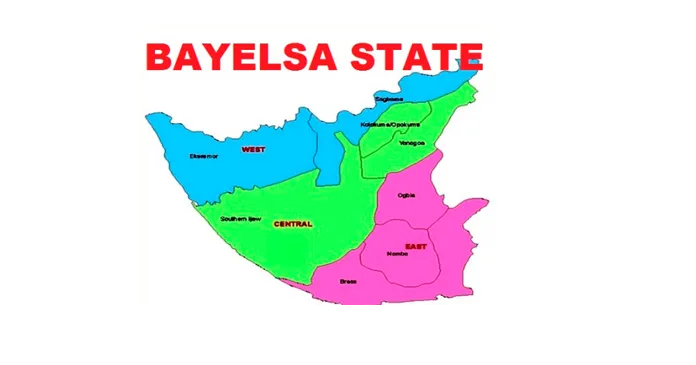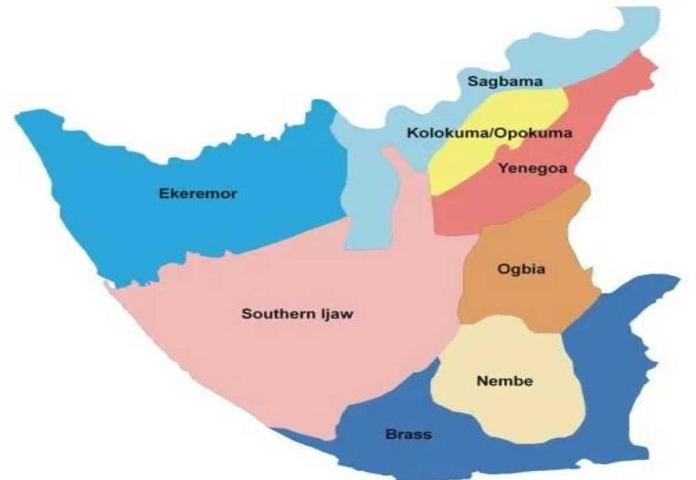There are eight local governments in Bayelsa State and they are Yenegoa, Ekeremor, Brass, Nembe, Kolokuma/Opokuma, Southern Ijaw, Ogbia, and Sagbama.
These local governments play a crucial role in the administration and governance of Bayelsa State, ensuring the delivery of public services to the residents and promoting grassroots development. Each LGA is headed by an elected chairman who oversees the affairs of the area. In this article, we will explore the different local governments in Bayelsa State, with specific details about each of them.
List of Local Governments in Bayelsa State and their Headquarters
Bayelsa State comprises eight local government areas (LGA), each with its distinct characteristics and identities. While some LGAs exhibit urban features and higher levels of development, others remain predominantly rural and have immense potential for growth in sectors such as agriculture, aquaculture, and tourism. The primary language spoken across Bayelsa State is the Ijaw language, but there are specific dialects spoken within each LGA.
Below is a list of all the local governments in Bayelsa State, along with their headquarters addresses:
1. Brass Local Government Area
- Headquarters: Twon-Brass
- Address: Twon-Brass, Bayelsa State
Brass LGA is widely recognized for its rich history, as it was a significant trading center during the pre-colonial era. The area is known for its vast oil and gas reserves, which contribute to the local economy. The Ijaw language is predominantly spoken in Brass LGA. It is a rural area with a developing infrastructure due to its oil and gas activities.
2. Ekeremor Local Government Area
- Headquarters: Ekeremor
- Address: Ekeremor, Bayelsa State
Ekeremor LGA is an area blessed with extensive agricultural land and fishing opportunities. The Ijaw language is the primary language spoken in this LGA as well. It is a rural area with considerable potential for development in agriculture and aquaculture.
3. Kolokuma/Opokuma Local Government Area
- Headquarters: Kaiama
- Address: Kaiama, Bayelsa State
Kolokuma/Opokuma LGA is an area characterized by small fishing settlements and agricultural activities, particularly palm oil production. The Epie-Atissa language is predominantly spoken in this LGA. Though it is predominantly rural, it is closer to urban centers, making it more developed compared to some other LGAs in Bayelsa State.
4. Nembe Local Government Area
- Headquarters: Nembe
- Address: Nembe, Bayelsa State
Nembe LGA embodies the fusion of culture, history, and tourism. It is renowned for its rich cultural heritage and traditional festivals. The Nembe language is predominantly spoken, along with other Ijaw dialects. Nembe LGA is a relatively urban area due to its proximity to large urban centers like Yenagoa, the state capital. It boasts some developed infrastructure and is an economic hub due to oil exploration activities.
5. Ogbia Local Government Area
- Headquarters: Ogbia
- Address: Ogbia, Bayelsa State
Ogbia LGA is known for being the birthplace of Nigeria’s former President, Goodluck Jonathan. The area is rich in oil and gas reserves and has a mix of rural and urban settlements. The Ogbia language, a variation of the Izon language, is predominantly spoken in this LGA. It has seen significant development due to its proximity to the state capital and oil exploration activities.
6. Sagbama Local Government Area
- Headquarters: Sagbama
- Address: Sagbama, Bayelsa State
Sagbama LGA is known for its agricultural productivity, particularly in the production of cassava, oil palm, and fishery activities. It is predominantly a rural area, with farming and fishing as the primary means of livelihood. Sagbama LGA has seen some development in recent years, but there is room for further improvement in infrastructure and other sectors.
7. Southern Ijaw Local Government Area
- Headquarters: Oporoma
- Address: Oporoma, Bayelsa State
Southern Ijaw LGA is the largest LGA in Bayelsa State in terms of land area. It is primarily characterized by rural settlements, with fishing and farming being the primary occupations. The Ijaw language is predominantly spoken in this LGA. Southern Ijaw LGA has experienced challenges caused by oil exploration activities, leading to some conflict and issues related to underdevelopment.
8. Yenagoa Local Government Area
- Headquarters: Yenagoa
- Address: Yenagoa, Bayelsa State
Yenagoa LGA is the capital of Bayelsa State and is the most developed area in the state. It serves as the administrative, commercial, and cultural center. The predominant language spoken in Yenagoa LGA is English, although the Ijaw language is also widely spoken. Yenagoa LGA is an urban area with a relatively high level of development, including infrastructure, healthcare facilities, educational institutions, and business opportunities.
Who Created Bayelsa?

Bayelsa state was created on October 1, 1996, by the military regime of General Sani Abacha. It was carved out of the former Rivers State. The creation of Bayelsa state was part of a series of state creations that aimed to address the need for better administration and development in smaller areas and to give the various ethnic groups in Nigeria a sense of belonging and representation.
The establishment of Bayelsa state was also driven by the agitation for resource control and greater autonomy by the people of the area, who felt marginalized within the larger Rivers State. Thus, the creation of Bayelsa state can be seen as a step towards decentralization and regional development in Nigeria.
What is the Capital of Bayelsa State?
The capital city of Bayelsa State is Yenagoa. Yenagoa, located in the southern region of Nigeria, is the administrative, political, and economic center of the state. It is the largest and most developed city in Bayelsa State. While other towns in the state have experienced some level of development, they do not match the scale and infrastructure of Yenagoa.
Yenagoa serves as a hub for commerce, education, and government activities in the state. It is home to several banks, markets, shopping malls, and government offices. The city also has a growing number of hotels, restaurants, and recreational facilities to cater to both residents and visitors.
In terms of infrastructure, Yenagoa is relatively well-developed compared to other cities in Bayelsa State. It has well-maintained roads, electricity supply, and access to basic amenities. The city also has a functional airport, the Bayelsa International Airport, facilitating both domestic and international travel.
While Yenagoa is the most developed city in Bayelsa State, other towns are also witnessing development to varying degrees. For example, cities like Ogbia, Brass, and Nembe have seen improvements in infrastructure and commercial activities due to their proximity to oil exploration and production activities in the region.
However, it is important to note that the development levels in these towns are not on par with Yenagoa. The capital city still remains the primary center of economic and social activities in Bayelsa State, boasting a larger population, more established facilities, and better services.
